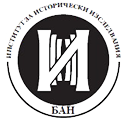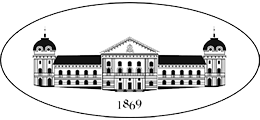The Institute for Historical Studies originates from the Commission for Collecting and Publishing Sources for Bulgarian History, which was established at the History and Philology Branch with the Bulgarian Academy of Sciences in March 1938. After the political changes in the country happened at the end of the Second World War and within the reforms undertaken in the BAS structure, on 3rd May 1947, drawing on the Commission for Sources, an Institute of Bulgarian History was established. After its affirmation as an academic research centre for historical studies in 1950, other research institutions joined the Institute, such as the Jewish Scientific Institute at the Central Consistory of Jews in Bulgaria (1952) and the Botev-Levski Institute (1960). Since 1960, the Institute acquired a new name. It has been simply called the Institute of History. In 1964 the institute’s section ‘History of the Balkan peoples’ was separated into a new academic Institute of Balkan studies, and in 1972 scientists from the Section on Ancient and Medieval History moved to the newly formed Institute of Thracology.
Under the conditions of the one-party communist regime and the Cold War the history science in the country advanced institutionally but was ingrained in a politicized and ideological framework. Since the 1960s the national continuities have been gradually rehabilitated and a partial return to themes and approaches of the research legacy until 1944 was commenced. After 1968, started a preparation of a multi-volume history of Bulgaria, which turned out to a paramount priority for the Institute. Since 1972 it was part of the newly established Unified Centre for Science and Historians’ Training that integrated the Bulgarian Academy of Sciences and the University of Sofia. In addition to structural changes, the overall scientific staff increased significantly in the coming years and research topics diversified, although political constraints remained on historical knowledge.
After the closure of the unified centres in 1989 and the political changes in the country which opened the way for its difficult democratization, the Institute restored its autonomous status within the BAS. In 1993-1994, the first major appraisal procedure of scholars was conducted and the institute obtained its current organizational structure. After a subsequent reform within the Bulgarian Academy of Sciences, in 2010 it adopted its current name: Institute for Historical Studies (IHS). In the decades after 1989, favourable conditions were created for scientific work of professional historians: expanded access to archival sources, opportunities to explore new topics in historiography, enrichment of the methodology of historical knowledge, free communication with historians abroad.
Over the years the Institute has been headed by its directors Acad. Ivan Snegarov (1947-1950), Acad. Dimităr Kosev (1950-1962), Acad. Christo Christov (1963-1988), Acad. Mito Isusov (1989-1993), Acad. Georgi Markov (1993-2011), Prof. Iliya Iliev (2011-2012), Prof. Iliya Todev (2012-2017), Assoc. Prof. Daniel Vachkov (since 2017).
Nowadays, the Institute for Historical Studies has been conducting fundamental and specialized research in the field of Bulgarian and world history from antiquity to the present day. Main research periods and topics are medieval history, history of the Bulgarians in the Ottoman history, Modern Bulgarian history (1878-1944), history of Bulgaria after the Second World War and to this day, history of the Bulgarian national question after 1878, the history of the world and international relations in modern and contemporary times, auxiliary history sciences and informatics.
The main periodicals of the Institute include the journals ‘Исторически преглед’ (since 1953) and ‘Bulgarian Historical Review’ (since 1973). The series ‘Известия на Института за българска история’ (since 1951), ‘Извори за българската история’ (since 1954), ‘Études historiques’ (since 1960) have also been published over time. The fruit of long-lasting research conducted by the Institute’s scholars is the multi-volume ‘История на България’ (‘History of Bulgaria’), of which nine volumes have been published so far (between 1979 and 2012), covering the history of today’s Bulgarian lands, Bulgaria and Bulgarians from antiquity to 1944.
The institute possesses its own library (since 1948), which is part of the academic library network, as well as a scientific archive (since 1969) with Bulgarian and mostly foreign documents and materials, which was created in connection with the preparation of the multi-volume history. The Institute’s scholars are sought for expert work by government institutions and non-governmental organizations, or as professionals and popularisers of the past in the media. They are also the core lecturers in the institute’s seminar ‘Topical problems of history and historiography’, which has been operating since 2013. The Institute attracts young scientists who make the connection between past and future of historical research. The institute’s scientists maintain cooperation through projects with research centres in countries of the European Union, Russia, China.

